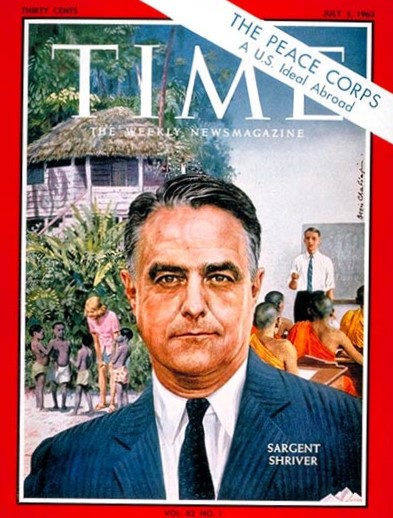Cold Hand of History: The Peace Corps, Part I
In 1989, Thomas G. Paterson, a Professor of History at the University of Connecticut, Storrs, put together the first major reassessment of JFK’s foreign policies. It was a collection of essays on everything from the covert war against Fidel Castro to the Peace Corps.
The essay on the Peace Corps is entitled “Passing the Torch and Lighting Fires: The Peace Corps.” It was written by Gary May, then and now, a Professor of History at …the University of Delaware. The essay is based mostly on a series of interviews he had with Ethiopian PCVs in the 1980s.
Reading that essay on the Peace Corps–the 11th and final chapter of the book entitled Kennedy’s Quest For Victory: American Foreign Policy, 1961-63, published by Oxford Press– it is striking how negative, harsh, and also realistic we were twenty plus years after our tour. Well, as reported by Gary May and based on a dozen or so RPCV interviews, and the reports on the Ethiopia Peace Corps project written by Meridan Bennett and Maureen Carroll (Philippines 1961-63) of the agency’s Evaluation Division.
It appears that Dr. May focused his whole article–and assessment of Kennedy’s Peace Corps–mainly on these interviews with Ethiopian Peace Corps Volunteers and a handful of HQ staff.
May begins his essay with the Ethie One Volunteers meeting Kennedy on the White House Lawn on August 9, 1962.
“Shortly past 4 o’clock the President appeared, accompanied by Harris Wofford, former presidential assistant for civil rights and recently appointed Peace Corps Director for Ethiopia.”
There were other Trainees that day on the lawn of the White House. Kennedy acknowledged those going to Nepal, Turkey, British Honduras, Ecuador, Venezuela, and Cyprus. And the 307 secondary school teachers for Ethiopia, he said. “Perhaps those of you going to Ethiopia could hold up their hands.”
May writes next, “For most, seeing the President was a ‘real highlight’ of the training period. However, Linda Bergthold, (Ethiopia) remembers, “underneath Kennedy’s words you could feel this wry, sarcastic, sardonic, cynical thing. I felt he thought, ‘What the hell, why not?’ Send those people out. What’s the worse they can do.'” (May interviewed Linda on August 25, 1982.)
“Bergthold had correctly sensed Kennedy’s ambivalence about the Peace Corps,” May goes onto write. In May’s view, “he [Kennedy] was reluctant to embrace the idea and eventually established the Peace Corps only after the public demanded it.”
Next, he quotes Harris Wofford, “Kennedy thought the Peace Corps was good public relations and very American. But I don’t think he saw any central role for it,”[in the conduct of American foreign policy.] (Interview with Wofford, September 3,1987.)
TIME Magazine, on the other hand, named the Peace Corps in 1961, “the greatest single success the Kennedy administration had produced.” In 1963 TIME would put Shriver and Peace Corps Volunteers on the cover of its magazine with the caption, “A U.S. Ideal Abroad.”

I prefer Time’s assessment.
NEW RITES AND FADING MEMORY, A ROMANZA
Calf-white and honey-brown we heard the call of the Peace Corps.
Now our youth is lost in the rain and the sun and fog and the sand.
Second-sight/half-sight, rearview-mirroring: but add love kissed us.
How many no’s do no-nothings/do-nothings add when they diss-us?
We were children of broken bisque porcelain, eggshell thin whose
need was desperate geography: so we sang out our healing songs.
At night our strange hearts’ music learned in youthful love in moon
silence remembers our America and the rites we created just in time.
(C) Edward Mycue Feb.1, 2016